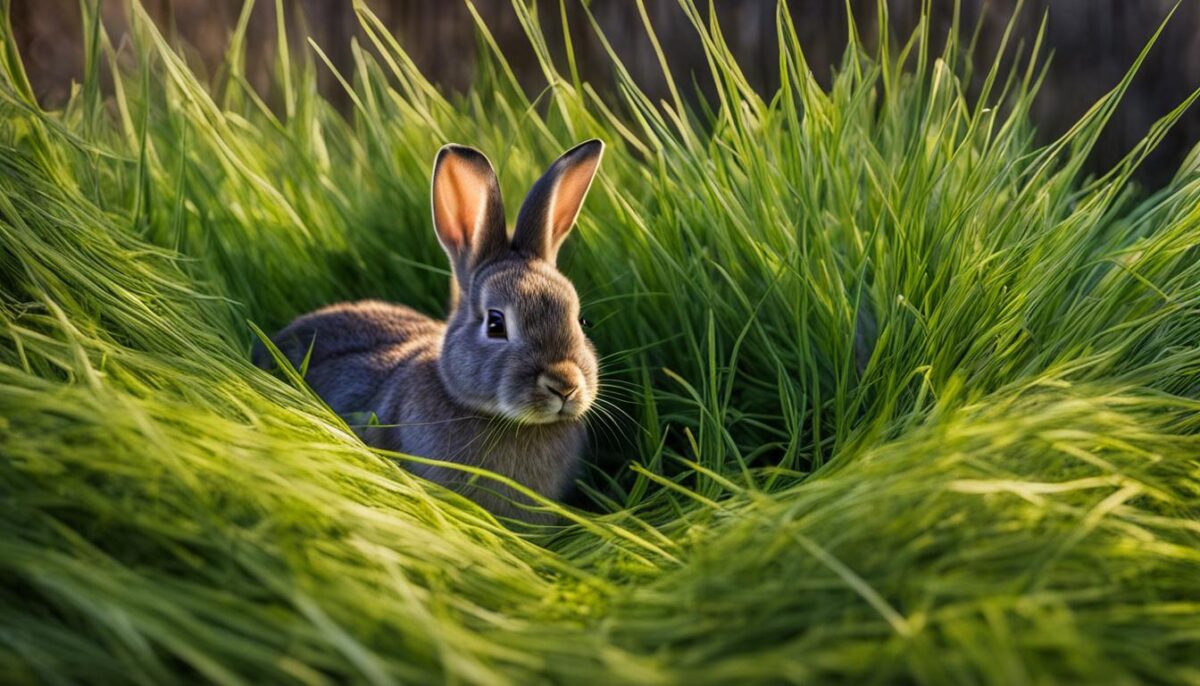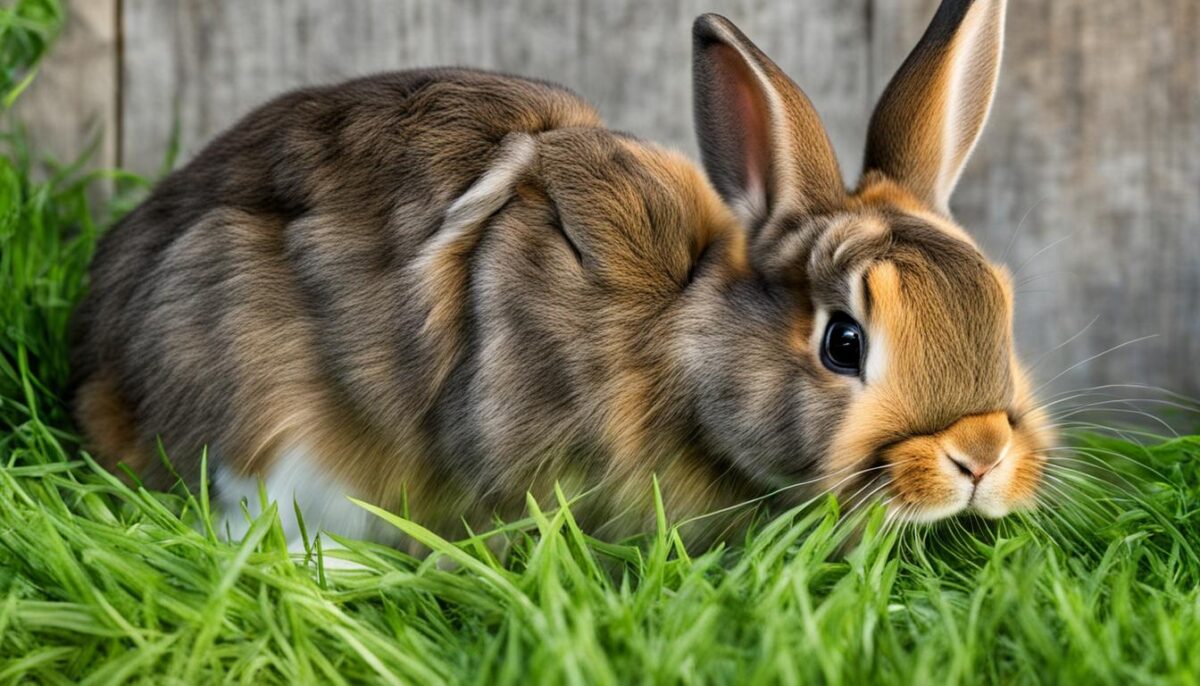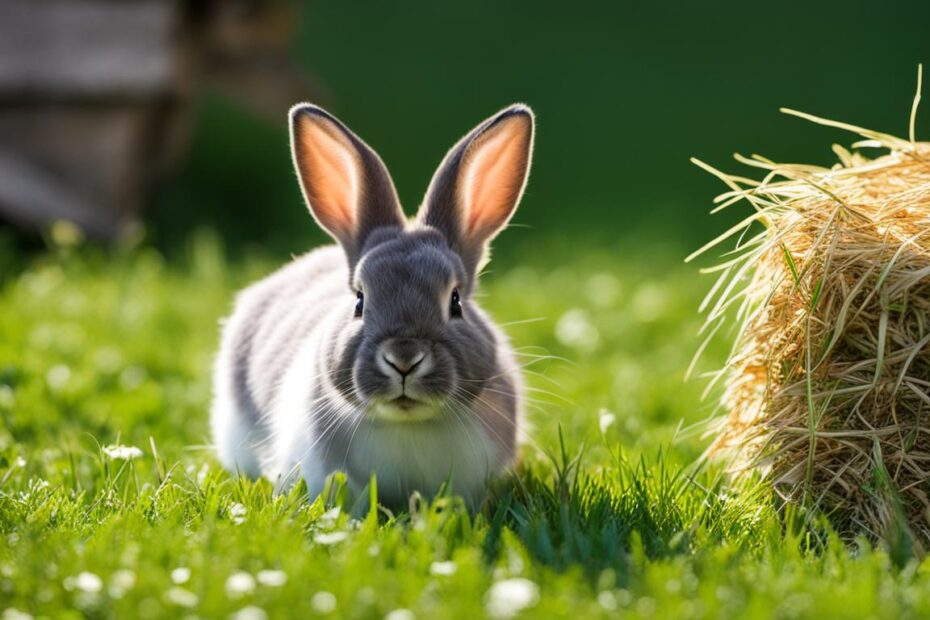When it comes to feeding our furry friends, it’s important to understand their nutritional needs. Many rabbit owners wonder if grass can be a suitable alternative to hay in their beloved pet’s diet. While rabbits in the wild naturally graze on grass, there are important factors to consider before making this dietary switch.
Rabbits have unique dietary requirements, and although grass can provide some nutrition, it may not fulfill all their needs. Hay, on the other hand, offers a more balanced and convenient option for meeting a rabbit’s dietary needs. Let’s explore the facts and discover what’s best for your bunny!
Key Takeaways:
- Grass alone may not provide all the necessary nutrients a rabbit needs for optimal health.
- Hay is essential for maintaining good dental hygiene, aiding in digestion, and providing vital fiber.
- Feeding bunnies with grass can be a supplement, but it should not replace hay entirely in their diet.
- Understanding the specific nutritional needs of rabbits is crucial when considering alternatives to hay.
- Choosing the right type of hay, such as Timothy hay or orchard grass hay, matches a rabbit’s nutritional requirements.
The Importance of Hay in a Rabbit’s Diet
Hay plays a crucial role in a rabbit’s diet. It is high in fiber, which is essential for maintaining proper digestion and preventing gut problems. Hay also helps wear down a rabbit’s continuously growing teeth, preventing dental issues. Additionally, hay provides necessary mental stimulation and encourages natural foraging behavior in rabbits. It is important to choose the right type of hay, such as Timothy hay or orchard grass hay, that matches a rabbit’s nutritional needs.
Timothy hay is one of the most popular options for rabbits’ diets due to its high fiber content and desirable taste. Orchard grass hay is characterized by a sweet smell and soft texture that rabbits enjoy. Offering a variety of grass hay types, such as meadow hay and oat hay, can provide rabbits with a varied diet and ensure they receive all the necessary nutrients.
In summary, hay is a critical component of a rabbit’s diet. It provides the necessary fiber for digestion, helps maintain dental health, and offers mental stimulation for rabbits. By understanding the nutritional requirements of bunnies and selecting the appropriate type of hay, rabbit owners can ensure their pets’ overall well-being and optimal health.
Grass vs Hay for Bunny Health
When it comes to the health of your bunny, the choice between feeding them grass or hay is an important one. While fresh grass might seem like a natural choice, there are several benefits to feeding bunnies with hay instead.
One of the key advantages of hay is that it provides a consistent and balanced source of nutrition for rabbits. Grass can vary in its nutritional content depending on the soil it grows in, while hay is specifically cultivated and dried to maintain its nutrient value. By feeding rabbits with hay, you can ensure they receive the necessary fiber, vitamins, and minerals they need to stay healthy.
Another advantage of feeding bunnies with hay is that it reduces the risk of exposure to harmful pesticides and parasites. Fresh grass can contain traces of chemicals or be contaminated with parasites, which can be detrimental to a rabbit’s health. Hay, on the other hand, is carefully harvested and processed to minimize these risks, making it a safer option for your furry friend.
| Benefits of Feeding Bunnies with Hay Instead of Grass |
|---|
| Provides a consistent and balanced source of nutrition |
| Reduces the risk of exposure to harmful pesticides and parasites |
| Contributes to maintaining overall health and well-being |
While fresh grass can still be offered as a supplement or as a source of enjoyment for rabbits, it should not replace hay entirely in their diet. Hay offers essential nutrients and dietary benefits that grass alone may not provide. By prioritizing hay as a primary food source for your bunny, you can help ensure their optimal health and well-being.
Can Bunnies Survive on Grass Alone?
Rabbits have a natural instinct to graze on grass, but can they survive on grass alone? While grass is a natural food for rabbits, it may not provide all the essential nutrients they need for long-term health. Grass lacks certain key nutrients and may be low in fiber, which can lead to digestive issues in rabbits. Therefore, relying solely on grass as a rabbit’s primary food source is not recommended.
Hay, on the other hand, is a more reliable and complete source of nutrition for rabbits. It is specifically cultivated and dried to maintain its nutrient value. Hay provides the necessary fiber, vitamins, and minerals that rabbits need for proper digestion and overall well-being. It also helps wear down a rabbit’s continuously growing teeth, preventing dental issues.
To ensure a balanced diet for rabbits, it is essential to incorporate hay into their daily meals. While fresh grass can be offered as a supplement or as a source of enjoyment for rabbits, it should not replace hay entirely. Providing a combination of hay and fresh grass allows rabbits to engage in natural grazing behavior while receiving all the necessary nutrients for their optimal health.
| Grass | Hay |
|---|---|
| Lacks certain key nutrients | Provides a complete source of nutrition |
| Low in fiber | High in fiber for proper digestion |
| Can lead to digestive issues | Helps maintain good digestive health |
| May vary in nutritional content | Cultivated and dried to maintain nutrient value |
By understanding the importance of hay in a rabbit’s diet and the potential limitations of relying solely on grass, rabbit owners can ensure their furry companions receive the proper nutrition they need for a healthy and happy life.
Understanding Types of Grass Hay for Rabbits
In order to provide a well-balanced diet for your rabbits, it is important to understand the different types of grass hay that are suitable for their nutritional needs. Here are some common varieties of grass hay that you can consider:
Timothy Hay
Timothy hay is one of the most popular options for rabbits. It is known for its high fiber content, which helps maintain a healthy digestive system. Timothy hay is also rich in essential nutrients and has a desirable taste that rabbits love.
Orchard Grass Hay
Orchard grass hay is characterized by its sweet smell and soft texture. It is another favorite among rabbits due to its high palatability. Orchard grass hay provides a good source of fiber and nutrients, making it a nutritious option for your bunnies.
Meadow Hay
Meadow hay consists of a mixture of soft-stemmed native grasses. It provides rabbits with a varied diet and helps prevent boredom. Meadow hay is rich in fiber and nutrients, making it an excellent choice for promoting good digestive health in rabbits.
| Type of Grass Hay | Main Characteristics | Nutritional Content |
|---|---|---|
| Timothy Hay | High fiber, desirable taste | Rich in essential nutrients |
| Orchard Grass Hay | Sweet smell, soft texture | Rich source of fiber and nutrients |
| Meadow Hay | Soft-stemmed native grasses | Varied diet, promotes good digestive health |
When choosing grass hay for your rabbits, it is important to consider their specific needs and preferences. Some rabbits may have allergies or sensitivities to certain types of hay, so it’s always best to introduce new varieties gradually. Providing a mix of different grass hays can also help ensure a well-rounded diet for your furry friends.

Tips to Encourage Rabbits to Eat Hay
Some rabbits may be hesitant to eat hay, especially if they are accustomed to a diet of other foods like fruits or seeds. However, it is crucial to ensure that rabbits consume hay as part of their daily diet, as it provides essential fiber and nutrients. Here are some tips to encourage rabbits to eat hay and successfully transition their diet:
- Introduce hay gradually: Start by offering a small amount of hay alongside their regular food. Allow the rabbits to become familiar with the texture and taste of hay before increasing the amount over time.
- Mix hay with other foods: You can mix hay with your rabbit’s favorite vegetables or pellets to make it more enticing. Gradually decrease the amount of mixed food as the rabbits become more comfortable with eating plain hay.
- Provide different types of hay: Offer a variety of hay types, such as Timothy hay or orchard grass hay, as rabbits may have preferences when it comes to taste and texture. This variety will also ensure that they receive a well-rounded diet.
- Make hay more interactive: Place hay in different areas of their enclosure or hide treats within the hay to encourage natural foraging behavior. This will make hay more engaging for rabbits and increase their interest in eating it.
Remember, patience is key when introducing hay to rabbits. It may take some time for them to adjust to the new diet, but with consistent effort and these tips, you can successfully encourage rabbits to eat hay and provide them with a nutritious and balanced diet.
| Pros | Cons |
|---|---|
| Hay provides essential fiber and nutrients for rabbits. | Some rabbits may be hesitant to eat hay initially. |
| Introducing hay gradually helps rabbits adjust to the new diet. | It may take time and effort to encourage rabbits to eat hay regularly. |
| Mixing hay with other foods makes it more enticing for rabbits. | Offering a variety of hay types can be more expensive. |
| Placing hay in different areas or hiding treats within it makes hay more interactive. | Transitioning rabbits to a hay-based diet requires patience and persistence. |
Feeding Bunnies with Grass Instead of Hay
While hay is typically recommended as the primary food source for rabbits due to its balanced nutrition and dental benefits, some bunny owners may wonder if grass can be a suitable alternative. Feeding bunnies with grass instead of hay can have its benefits, but it’s important to understand the considerations involved.
One of the main advantages of feeding bunnies with grass is that it mimics their natural diet. Rabbits in the wild graze on fresh grass, which helps wear down their continuously growing teeth. Offering fresh grass to pet rabbits can help promote dental health and provide mental stimulation through natural foraging behaviors.
However, it is crucial to ensure that the grass is free from pesticides and other contaminants. Rabbits are particularly sensitive to toxins, so it’s important to provide them with organic and pesticide-free grass. Additionally, offering a variety of grasses can help ensure a balanced diet and provide a wide range of nutrients.
| Benefits of Feeding Bunnies with Grass Instead of Hay: |
|---|
| • Mimics their natural diet |
| • Promotes dental health |
| • Provides mental stimulation |
It’s important to note that while grass can be a valuable addition to a rabbit’s diet, it may not provide all the necessary nutrients for optimal health. Hay is still recommended as a consistent and balanced source of nutrition for rabbits. It ensures proper digestion, prevents dental issues, and offers essential fiber that may not be present in grass alone.
Ultimately, a combination of hay and fresh grass can provide a well-rounded diet for rabbits, meeting their nutritional needs and promoting overall well-being. Consulting with a veterinarian can help determine the ideal balance between hay and grass based on a rabbit’s individual requirements and health status.

Growing Your Own Grass for Rabbits
Growing your own grass for rabbits can be a rewarding and cost-effective way to provide fresh food for your pet. Not only does it allow you to control the quality of the grass and ensure it is free from contaminants, but it also offers a plethora of benefits for your furry friend.
By growing your own grass, you can offer rabbits a diverse range of options that may not be available commercially. Clover, orchard grass, bluegrass, and sorghum are just a few of the grasses you can cultivate for your rabbits. Providing a variety of grasses not only adds nutritional value to their diet but also gives rabbits a more interesting and stimulating eating experience.
One of the advantages of growing your own grass is that it provides rabbits with mental stimulation and encourages natural foraging behavior. Rabbits are natural grazers, and having access to fresh grass allows them to engage in this instinctive behavior. In addition, growing your own grass can help improve your rabbit’s dental health. The continuous chewing required to eat grass helps wear down their teeth, preventing dental issues in the long run.
Creating a safe and suitable environment for growing grass is essential. Ensure that the area is free from pesticides and other harmful substances that could be detrimental to your rabbit’s health. You may consider dedicating a specific portion of your garden or using large pots for indoor cultivation. By implementing proper care and maintenance, you can provide your rabbits with a fresh and nutritious food source that promotes their overall well-being.
Conclusion
In conclusion, while rabbits can eat grass, hay remains an essential part of their diet for optimal health. Hay provides the necessary fiber, nutrients, and dental benefits that grass alone may not provide. It ensures proper digestion, prevents dental issues, and offers mental stimulation for rabbits. While fresh grass can be offered as a supplement or as a source of enjoyment for rabbits, it should not replace hay entirely.
It is important to provide a balanced diet that includes both hay and fresh grass to meet a rabbit’s nutritional needs and ensure their overall well-being. Hay is specially cultivated and dried to maintain its nutritional value, providing a consistent source of nutrients for rabbits. It also reduces the risk of exposure to harmful pesticides and parasites compared to relying solely on grass.
When considering alternatives to hay, it’s crucial to understand the specific nutritional needs of rabbits and choose the right type of hay that matches those requirements. Offering a variety of grass hay types, such as Timothy hay or orchard grass hay, can provide rabbits with a varied diet and keep them interested in their food.
FAQ
Can rabbits survive on grass alone?
While rabbits can technically survive on grass alone, it may not provide all the essential nutrients they need for long-term health. Grass lacks some key nutrients and may be low in fiber, which can lead to digestive issues in rabbits.
Why is hay important in a rabbit’s diet?
Hay plays a crucial role in a rabbit’s diet. It helps maintain good dental hygiene, aids in digestion, provides the essential fiber necessary for a healthy rabbit, and encourages natural foraging behavior.
What are the benefits of feeding bunnies with hay instead of grass?
Feeding rabbits with hay instead of relying solely on grass ensures a consistent and balanced diet, provides necessary mental stimulation, reduces the risk of exposure to harmful pesticides and parasites, and helps prevent dental issues.
What types of grass hay are suitable for rabbits?
Suitable types of grass hay for rabbits include Timothy hay, orchard grass hay, meadow hay, oat hay, wheat and barley hay, alfalfa hay, and rye grass hay. The specific type should be chosen based on a rabbit’s nutritional needs and preferences.
How can I encourage rabbits to eat hay?
To encourage rabbits to eat hay, it is important to gradually introduce it into their diet, mix it with other foods, provide hay in clumps or hide treats within the hay. Offering a variety of hay types can also help keep rabbits interested.
Can bunnies eat grass instead of hay?
Feeding bunnies with grass instead of hay can be a viable option, as long as it is used as a primary food source and the rabbits have access to fresh grass for grazing. However, it is important to ensure a balanced diet and provide adequate nutrition.
How can I grow my own grass for rabbits?
You can grow your own grass for rabbits by planting various grasses such as clover, orchard grass, bluegrass, sorghum, and soybeans. Growing your own grass allows you to control quality and provide mental stimulation for rabbits.
Can bunnies eat grass instead of hay for optimal health?
While rabbits can eat grass, hay remains an essential part of their diet for optimal health. Hay provides the necessary fiber, nutrients, and dental benefits that grass alone may not provide.
What is the conclusion about whether bunnies can eat grass instead of hay?
While fresh grass may be a natural food for rabbits, a diet solely based on grass may not provide all the necessary nutrients for a domesticated rabbit’s optimal health. Hay ensures proper digestion and overall well-being for rabbits.


